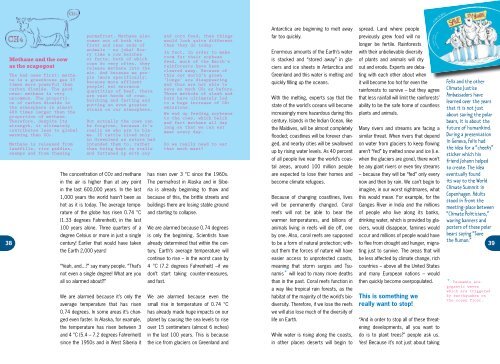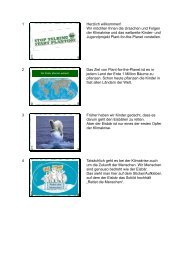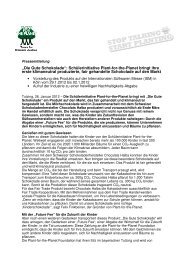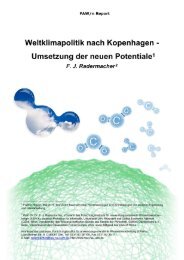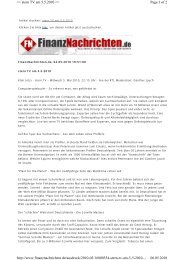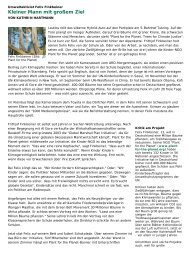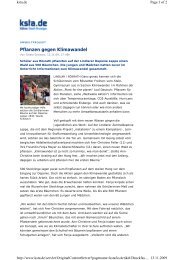Create successful ePaper yourself
Turn your PDF publications into a flip-book with our unique Google optimized e-Paper software.
Methane and <strong>the</strong> cow<br />
as <strong>the</strong> scapegoat<br />
The bad news first: methane<br />
is a greenhouse gas 25<br />
times more powerful than<br />
carbon dioxide. The good<br />
news: methane is very<br />
uncommon. The proportion<br />
of carbon dioxide in<br />
<strong>the</strong> atmosphere is almost<br />
400 times larger than <strong>the</strong><br />
proportion of methane.<br />
There<strong>for</strong>e, despite its<br />
strength, it ultimately<br />
contributes less to global<br />
warming than CO2.<br />
Methane is released from<br />
landfills, rice paddies,<br />
swamps and from thawing<br />
permafrost. Methane also<br />
comes out of both <strong>the</strong><br />
front and rear ends of<br />
animals – no joke! Every<br />
time a cow belches<br />
or farts, both of which<br />
cows do very often, <strong>the</strong>y<br />
release methane into <strong>the</strong><br />
air. And because we people<br />
(more specifically:<br />
because more affluent<br />
people) eat enormous<br />
quantities of beef, <strong>the</strong>re<br />
are vast herds of cows,<br />
belching and farting and<br />
putting an even greater<br />
strain on our atmosphere.<br />
But actually <strong>the</strong> cows can<br />
be <strong>for</strong>given, because it’s<br />
really we who are to blame.<br />
If cattle lived only<br />
in Greenland as nature had<br />
intended <strong>the</strong>m to, ra<strong>the</strong>r<br />
than being kept in stalls<br />
and fattened up with soy<br />
The concentration of CO2 and methane<br />
and corn feed, <strong>the</strong>n things<br />
would look quite different<br />
than <strong>the</strong>y do today.<br />
In fact, in order to make<br />
room <strong>for</strong> <strong>the</strong>ir soybean<br />
feed, much of <strong>the</strong> Earth’s<br />
rain<strong>for</strong>ests have been<br />
cleared away. Because of<br />
this our world’s green<br />
‘lungs’ are disappearing<br />
and thus are not able to<br />
save as much CO2 as be<strong>for</strong>e.<br />
These methods of slash and<br />
burn have ultimately led<br />
to a huge increase of CO2<br />
emissions.<br />
We end up feeding soybeans<br />
to <strong>the</strong> cows, which belch<br />
and fart methane all day<br />
long so that we can eat<br />
meat every day.<br />
Do we really need to eat<br />
that much meat?<br />
has risen over 3 °C since <strong>the</strong> 1960s.<br />
Antarctica are beginning to melt away<br />
far too quickly.<br />
Enormous amounts of <strong>the</strong> Earth’s water<br />
is stacked and “stored away” in glaciers<br />
and ice sheets in Antarctica and<br />
Greenland and this water is melting and<br />
quickly filling up <strong>the</strong> oceans.<br />
With <strong>the</strong> melting, experts say that <strong>the</strong><br />
state of <strong>the</strong> world’s oceans will become<br />
increasingly more hazardous during this<br />
century. Islands in <strong>the</strong> Indian Ocean, like<br />
<strong>the</strong> Maldives, will be almost completely<br />
flooded; coastlines will be <strong>for</strong>ever changed,<br />
and near<strong>by</strong> cities will be swallowed<br />
up <strong>by</strong> rising water levels. As 40 percent<br />
of all people live near <strong>the</strong> world’s coastal<br />
areas, around 100 million people<br />
are expected to lose <strong>the</strong>ir homes and<br />
spread. Land where people<br />
previously grew food will no<br />
longer be fertile. Rain<strong>for</strong>ests<br />
with <strong>the</strong>ir unbelievable diversity<br />
of plants and animals will dry<br />
out and erode. Experts are debating<br />
with each o<strong>the</strong>r about when<br />
it will become too hot <strong>for</strong> even <strong>the</strong><br />
rain<strong>for</strong>ests to survive – but <strong>the</strong>y agree<br />
that less rainfall will limit <strong>the</strong> rain<strong>for</strong>ests’<br />
ability to be <strong>the</strong> safe home of countless<br />
plants and animals.<br />
Many rivers and streams are facing a<br />
similar threat. When rivers that depend<br />
on water from glaciers to keep flowing<br />
aren’t “fed” <strong>by</strong> melted snow and ice (i.e.<br />
when <strong>the</strong> glaciers are gone), <strong>the</strong>re won’t<br />
be any giant rivers or even tiny streams<br />
– because <strong>the</strong>y will be “fed” only every<br />
Felix and <strong>the</strong> o<strong>the</strong>r<br />
Climate Justice<br />
Ambassadors have<br />
learned over <strong>the</strong> years<br />
that it is not just<br />
about saving <strong>the</strong> polar<br />
bears, it is about <strong>the</strong><br />
future of humankind.<br />
During a presentation<br />
in Geneva, Felix had<br />
<strong>the</strong> idea <strong>for</strong> a “cheeky”<br />
sticker which his<br />
friend Johann helped<br />
to create. The idea<br />
eventually found<br />
its way to <strong>the</strong> World<br />
Climate Summit in<br />
Copenhagen. Adults<br />
stood in front <strong>the</strong><br />
meeting-place between<br />
“Climate Politicians,”<br />
waving banners and<br />
posters of <strong>the</strong>se polar<br />
bears saying “Save<br />
in <strong>the</strong> air is higher than at any point The permafrost in Alaska and in Sibe-<br />
become climate refugees.<br />
now and <strong>the</strong>n <strong>by</strong> rain. We can’t begin to<br />
in <strong>the</strong> last 600,000 years. In <strong>the</strong> last ria is already beginning to thaw and<br />
imagine, in our worst nightmares, what<br />
1,000 years <strong>the</strong> world hasn’t been as because of this, <strong>the</strong> brittle streets and<br />
Because of changing coastlines, lives this would mean. For example, <strong>for</strong> <strong>the</strong><br />
hot as it is today. The average tempe- buildings <strong>the</strong>re are losing stable ground<br />
will be permanently changed. Coral Ganges River in India and <strong>the</strong> millions<br />
rature of <strong>the</strong> globe has risen 0.74 °C and starting to collapse.<br />
reefs will not be able to bear <strong>the</strong> of people who live along its banks,<br />
(1.33 degrees Fahrenheit), in <strong>the</strong> last<br />
warmer temperatures, and billions of drinking water, which is provided <strong>by</strong> gla-<br />
100 years alone. Three quarters of a We are alarmed because 0.74 degrees<br />
animals living in reefs will die off, one ciers, would disappear, famines would<br />
38<br />
degree Celsius or more in just a single<br />
century! Earlier that would have taken<br />
is only <strong>the</strong> beginning. Scientists have<br />
already determined that within <strong>the</strong> cen-<br />
<strong>by</strong> one. Also, coral reefs are supposed<br />
to be a <strong>for</strong>m of natural protection; with-<br />
occur and millions of people would have<br />
to flee from drought and hunger, migra-<br />
<strong>the</strong> Human.”<br />
39<br />
<strong>the</strong> Earth 2,000 years!<br />
tury, Earth’s average temperature will<br />
out <strong>the</strong>m <strong>the</strong> <strong>for</strong>ces of nature will have ting just to survive. The areas that will<br />
continue to rise – in <strong>the</strong> worst case <strong>by</strong><br />
easier access to unprotected coasts, be less affected <strong>by</strong> climate change, rich<br />
“Yeah, and...?” say many people. “That’s 4 °C (7.2 degrees Fahrenheit) –if we<br />
meaning that storm surges and Tsu- countries – above all <strong>the</strong> United States<br />
not even a single degree! What are you don’t start taking counter-measures,<br />
namis* will lead to many more deaths and many European nations – would<br />
all so alarmed about?!”<br />
and fast.<br />
than in <strong>the</strong> past. Coral reefs function in <strong>the</strong>n quickly become overpopulated. * Tsunamis are<br />
a way like tropical rain <strong>for</strong>ests, as <strong>the</strong><br />
gigantic waves<br />
which are triggered<br />
We are alarmed because it’s only <strong>the</strong><br />
average temperature that has risen<br />
We are alarmed because even <strong>the</strong><br />
small rise in temperature of 0.74 °C<br />
habitat of <strong>the</strong> majority of <strong>the</strong> world’s biodiversity.<br />
There<strong>for</strong>e, if we lose <strong>the</strong> reefs<br />
This is something we<br />
really want to stop!<br />
<strong>by</strong> earthquakes on<br />
<strong>the</strong> ocean floor.<br />
0.74 degrees. In some areas it’s chan- has already made huge impacts on our<br />
we will also lose much of <strong>the</strong> diversity of<br />
ged even faster. In Alaska, <strong>for</strong> example, planet <strong>by</strong> causing <strong>the</strong> sea levels to rise<br />
life on Earth.<br />
“And in order to stop all of <strong>the</strong>se threat-<br />
<strong>the</strong> temperature has risen between 3 over 15 centimeters (almost 6 inches)<br />
ening developments, all you want to<br />
and 4 °C (5.4 – 7.2 degrees Fahrenheit) in <strong>the</strong> last 100 years. This is because<br />
While water is rising along <strong>the</strong> coasts, do is to plant trees?” people ask us.<br />
since <strong>the</strong> 1950s and in West Siberia it <strong>the</strong> ice from glaciers on Greenland and<br />
in o<strong>the</strong>r places deserts will begin to Yes! Because it’s not just about taking


